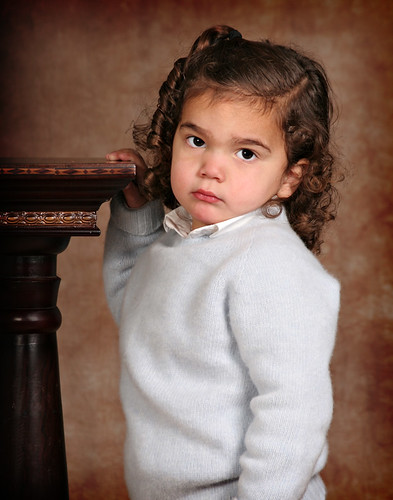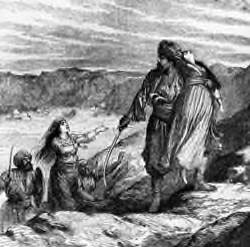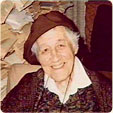 Rabbi Jennifer Kaluzny, a member of the clergy at Temple Israel in Michigan, recently retold the following story as an introduction to her commentary on the Torah portion on Parshat Kedoshim.
Rabbi Jennifer Kaluzny, a member of the clergy at Temple Israel in Michigan, recently retold the following story as an introduction to her commentary on the Torah portion on Parshat Kedoshim.Last week, Rabbi Marla Hornsten told me just about the best story I have ever heard. It is simple in its language and short in length, but it contains such a powerful statement that I cannot stop thinking about it.While Rabbi Kaluzny insists that this story dramatizes the great success of the Reform movement, to me it's a clear demonstration of its greatest failure that no one really talks about because they're not allowed to: the feminization of liberal Judaism.
Perhaps the greatest part of this story is that it came from her son Benji.
Rabbi Hornsten's family had come in to town for a visit from Seattle and her parents were happily playing with their grandchildren, 4-year-old Benji and 2-year-old Danny. Her dad asked Benji, "Are you going to be a doctor like your daddy?" Benji replied, "I don't know." Then grandpa asked, "Are you going to be a rabbi like your mommy?" To which Benji replied, "I can't be a rabbi; I'm not a girl!"
Wow! Would this statement have been made even 10 years ago? Benji's world view is so vastly different than mine was when I was his age, and we are technically only one generation apart. Growing up, I did not have a female rabbinical role model, but I didn't ever consider that there might be a barrier to fulfilling my dream of becoming a rabbi.
For Benji, women rabbis are not only the norm, they are the standard! Though he knows our male colleagues, to this perceptive 4-year-old, his mom is the icon of what a rabbi is; and so to him, mainly women are rabbis, with a few men sprinkled here and there.
This past week, an article from the JTA entitled "Reform Try Separating Sexes in Effort to Lure Men Back" highlighted the growing disenchantment of men with the reform movement. Basically, men aren't interested in coming to synagogue anymore. Can there really be any wonder why? The article states:
And in order to combat that disillusionment, the movement is trying to create mens-only programs that will be interesting and meaningful for men. Is that really what Jennifer Kaluzny had in mind when she touted the incredible gains that the movement has made in the past thirty years?Some are calling women's increased participation in Jewish life the "feminization" of Judaism. But they say it quietly, fearing a backlash. That backlash comes fast. One woman asked Barden testily after his address to the symposium what he meant by saying "a form of censorship has taken over the movement."
Most interesting to me is the number of times the article notes the obvious similarities between this "men-only" minyan, and Orthodoxy, and the great emphasis that Reform Judaism is placing on the fact that this is NOT Orthodox. But at the same time, they can't seem to come to grips with the fact that men want no part of an unsegregated service. They don't find it meaningful, spiritual or appealing. So they've stopped coming.
In essence, the men are voting with their feet, articulating a truth that Orthodoxy has been espousing for centuries: men and women are different. They have different needs and very different roles. Moreover, the notion that they must be pigeon-holed into the same roles both personally and religiously has alienated the men.
But there's another important point as well. By robbing the men of a safe and inviting religious space and driving men out of the shul, the Reform movement is creating an entire generation of men alienated not only from the shul, but from Judaism in general. After all, if the synagogue is the point of entry for religious life (and it is), then without men entering at the point, they're bereft of meaningful spirituality.
An April article in the World Jewish Digest entitled "The Missing Piece" describes the squeeze religiously motivated liberal Jewish women find themselves in when searching for a Jewish mate.
Perhaps most painful, especially for those in the Reform and Conservative movements, is that Jewish men are increasingly alienated from synagogue and communal life - and some hold active antipathy toward Jewish women. A monograph to be released this spring by Dr. Sylvia Barack Fishman, a professor of Contemporary Jewish Life at Brandeis University, and Daniel Parmer, a Brandeis University graduate student who works with her, shows for the first time that as women have become more active in Jewish ritual life and culture, men have increasingly disappeared, rejecting both the trappings of communal affiliation and Jewish women. Seen in this light, the "singles crisis" is not an isolated problem, but rather a symptom of a more radical one: a pervasive identity crisis that profoundly affects Jewish men.As long as the liberal movements insist on digging in their heels and forcing an equality on men without considering the consequences, the "man problem" will only get worse.




 In honor of Yom Ha'atzmaut, I would like to share with you a thought sent to me by my good friend
In honor of Yom Ha'atzmaut, I would like to share with you a thought sent to me by my good friend 
